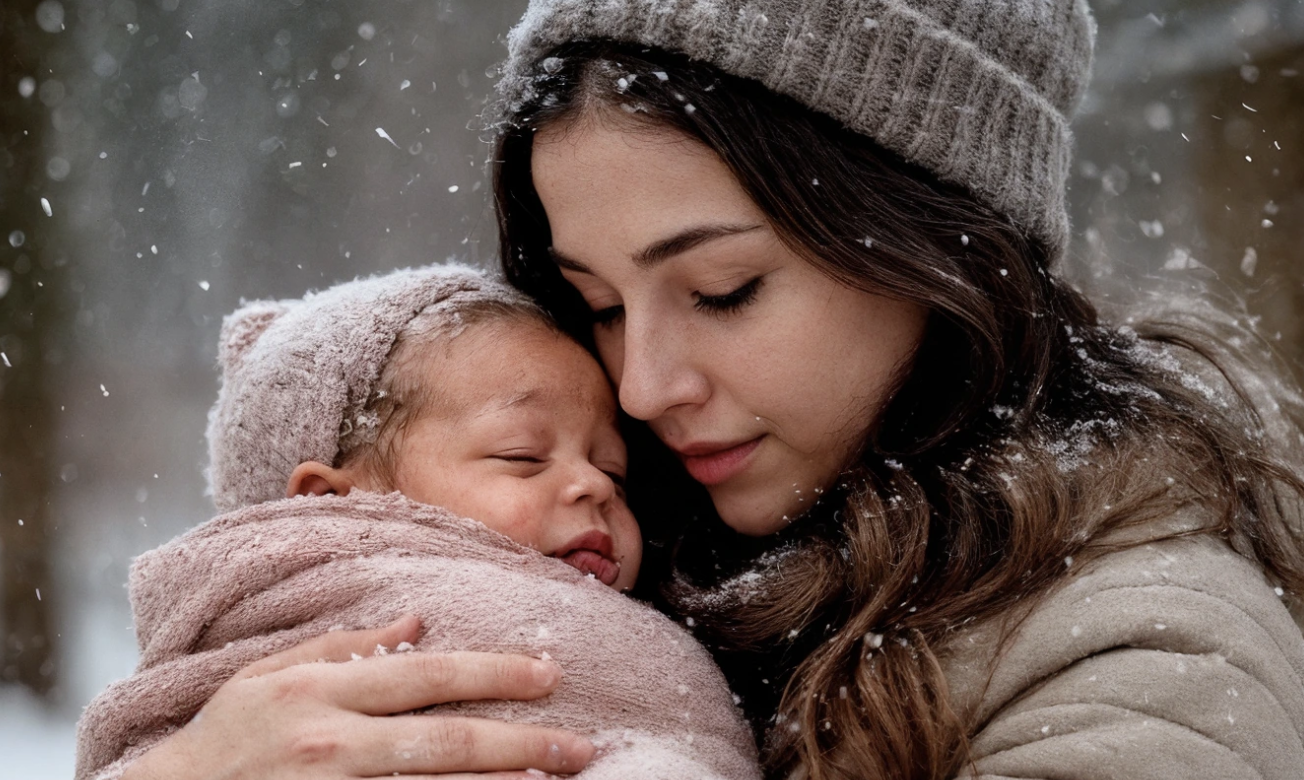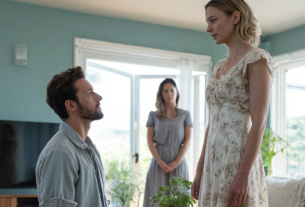Snow fell quietly and softly. It covered the streets, the rooftops of houses, settled on the shoulders of passersby. Through the thick white veil, a woman made her way. In her arms, she held a child — a tiny bundle wrapped in a gray blanket, with a small hat on his head. The boy slept peacefully, pressed against her chest, unaware that his life was about to change forever.
The woman stopped in front of a building with a peeling sign: “Baby House No. 4.” She lifted her eyes, as if seeking forgiveness or strength from the sky. But it remained deaf and silent. Her hands trembled, her heart pounded so hard it seemed it could be heard from miles away.
She slowly laid the infant on the doorstep and placed a note beside him:
“Misha. Forgive me. I love him. I can’t do otherwise.”
She stood there a little longer, as if hoping someone would stop her. Her fingers clenched convulsively, her shoulders shook with suppressed sobs. Then she took a step back. Another. And ran. Into the night, into the darkness, away from everything she had known.
A few minutes later, the door swung open. On the threshold appeared Valentina Sergeyevna — a woman of about fifty, a caregiver at the baby house. Seeing the child, she quickly bent down, gently lifted him, and held him close:
“Who could have abandoned you, dear?.. You would have frozen here…”
She did not yet know that this moment would stay with her forever. Like snowflakes melting on a baby’s eyelashes, like him curling into a ball involuntarily, as if feeling the cold of this world.
For Misha, this home became the first and only one. First — a crib with bars. Then — a kindergarten group with yellow lockers. Later — a schoolroom smelling of old textbooks and linoleum.
He got used to it. Used to Valentina Sergeyevna’s voice, to the strictness of Evgeniya Arkadyevna, to the endless reminders of “don’t make noise, don’t misbehave.” He got used to expecting nothing good. Because every time “the adults” came — people who could take him out of the orphanage — his heart stopped. But then it happened again: no one chose him. And he pretended he didn’t care.
When Misha was eight, his friend Sanya said:
“What if your mom is alive? Maybe she’s looking for you?”
“No,” Misha answered quietly.
“Why do you think that?”
“Because if she were looking, she would have found me long ago.”
He said it calmly. But that night he lay with his face in the pillow for a long time, holding back tears so no one would hear.
Years passed. The orphanage taught survival: how to defend yourself, take a hit, be part of the group. But Misha was different. He read a lot, dreamed, wanted to learn. He did not want to stay here forever.
When he turned fourteen, he asked Valentina Sergeyevna:
“Why did she leave me?”
She was silent before answering.
“Sometimes people don’t choose. Sometimes life is too cruel. Maybe it was very hard for her too.”
“Would you have left?”
She didn’t answer. Just gently stroked his head.
When Misha turned sixteen, he received his first passport. In the “father” field — a dash. In the “mother” field — nothing.
He lived in the orphanage, prepared to enter college. In the evenings he worked as a loader at a warehouse outside the city — washing floors, moving boxes, enduring drivers’ swearing.
He didn’t complain. He knew: if he broke down, nothing would be left.
Sometimes he dreamed the same dream: running across a boundless field. In the distance — a woman. She waved at him, called him, but he couldn’t hear her words. He ran, shouted, but the closer he got, the farther she moved away.
One evening he opened an old cabinet and found that very note. It was kept in his personal file, which he had secretly asked Valentina Sergeyevna for. The paper was crumpled, the letters blurry, as if written by the trembling hand of a young scared girl.
“Misha. Forgive me. I love him. I can’t do otherwise.”
He reread the lines again and again, as if trying to feel every word deeply. And one day he came to the conclusion: he could no longer live without the truth.
He started with archives. He made an appointment at the registry office, learned the number of his file — the very one under which he was admitted to the baby house. The information was minimal: date of birth, health status, approximate age. That was all. But there was the note. The very one.
And there was one lead — the maternity hospital number.
Misha went there. He was met by a woman with piercing blue eyes — midwife Maria Petrovna, who had worked at that hospital since the late nineties.
“January 2004?” she pondered. “I remember one girl. Very young. Came from a village. Gave birth to a boy… Then disappeared. Didn’t even register the documents. We tried to find her, but it was like she vanished into thin air.”
“What was her name?”
“I think Lena or Alyona… She was thin, cried all the time. Said her mother kicked her out, the child’s father left.”
It was more than he dared hope to hear.
He went to the district archive, flipped through records of newborns from that period. One record dated January 11 read: “boy, mother unknown, maternity hospital No. 3.” That was him.
Next came trips to villages. Misha went door to door, questioned old residents. Some hid away; others said, “You can’t go back to the past, son.”
But in one village — Nikolskoye — he got lucky. In the local shop he saw a woman with the same gray eyes as his. Something inside him twitched.
“Excuse me… Is your name Lena?” he asked cautiously.
The woman turned. Her face suddenly went pale.
“Misha…?”
“How do you know my name?”
“I…” She sat down on the porch steps. “I’ve remembered you all my life. I left you because I didn’t know how to live. I was seventeen. Kicked out of my home. Hiding in a basement. I had no money, no food. I thought if I stayed with you, we’d both die. So I left. I didn’t sleep for nights after that. Prayed every day. Tried to find you, but no one told me anything…”
He was silent.
“I’m not asking for forgiveness. Not asking for love. I just wanted you to know: I loved you. Always. I was just weak.”
He slowly came closer and sat next to her. Looked into the distance. Then quietly said:
“I don’t know what to call you now. Don’t know how to build this… But I want to try.”
She cried. He did too.
Two lonely hearts found each other.
Six months passed. Misha transferred to correspondence studies, got a job as an assistant librarian in the village. He rented a room in Lena’s house — now he called her mom, even if not right away.
They ate dinner together, planted flowers on the windowsill, walked in the forest. Misha hadn’t forgotten the pain of the years lived, but now he knew — he was not alone.
One evening he brought her an old photo: the orphanage, him at seven, wearing a hat with a pompom, with Sanya nearby.
“This is my friend. Now he’s in prison. No one writes to him. Maybe we should visit?”
“Of course, son.”
That word felt strange. But at the same time — warm. Alive. His own.
Epilogue
Sometimes fate takes too much. Sometimes pain becomes the foundation for something new. Sometimes a broken heart still knows how to love.
Misha walked a long path — from the cold doorstep of the orphanage to the warm comfort of a mother’s home. He understood: forgiveness is not necessary to build a new life. But knowing the truth is important.
And the truth was in her eyes. In her hands trembling with emotion as she stroked his hair. In her smile when he called her “mom.”



